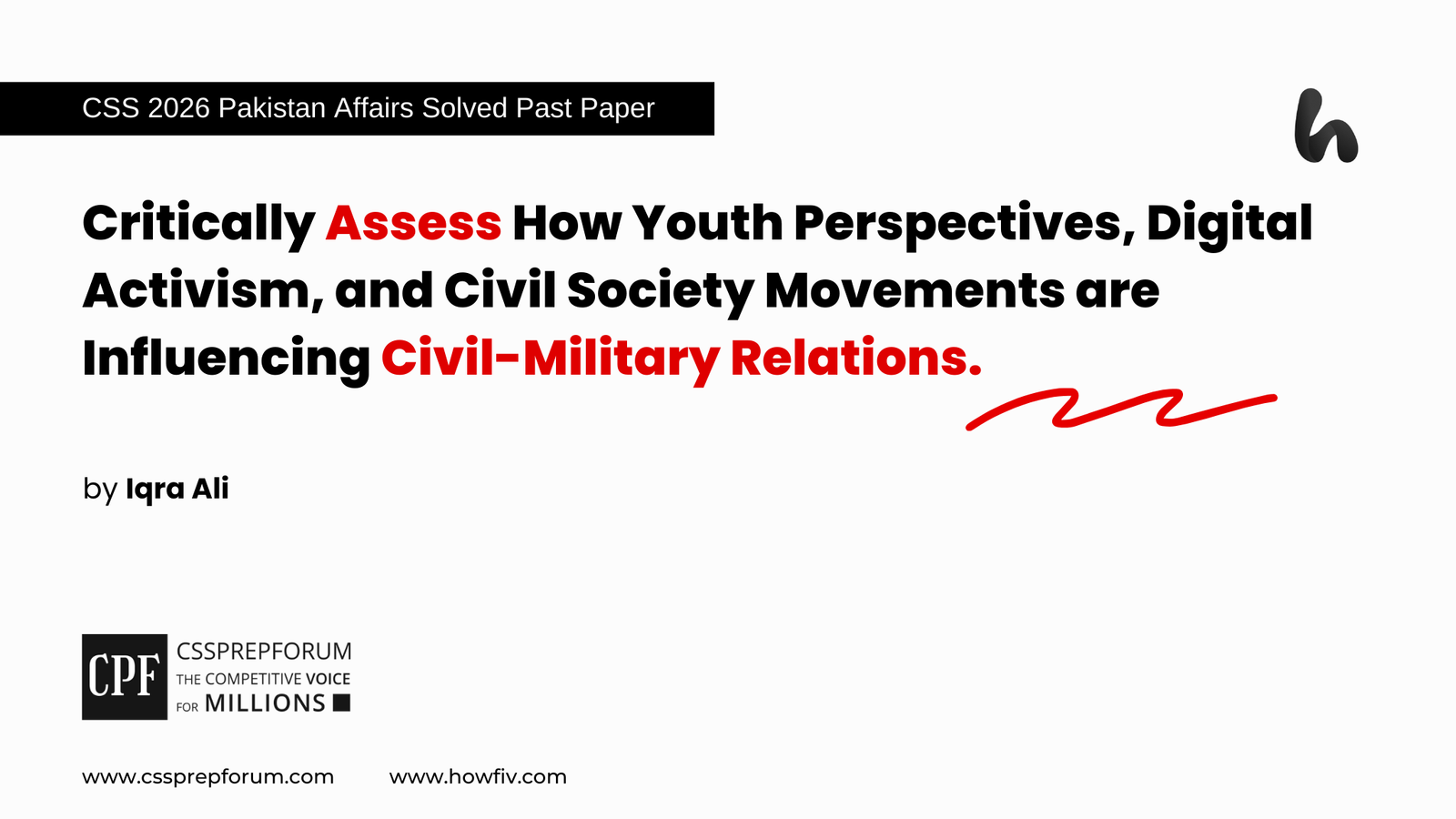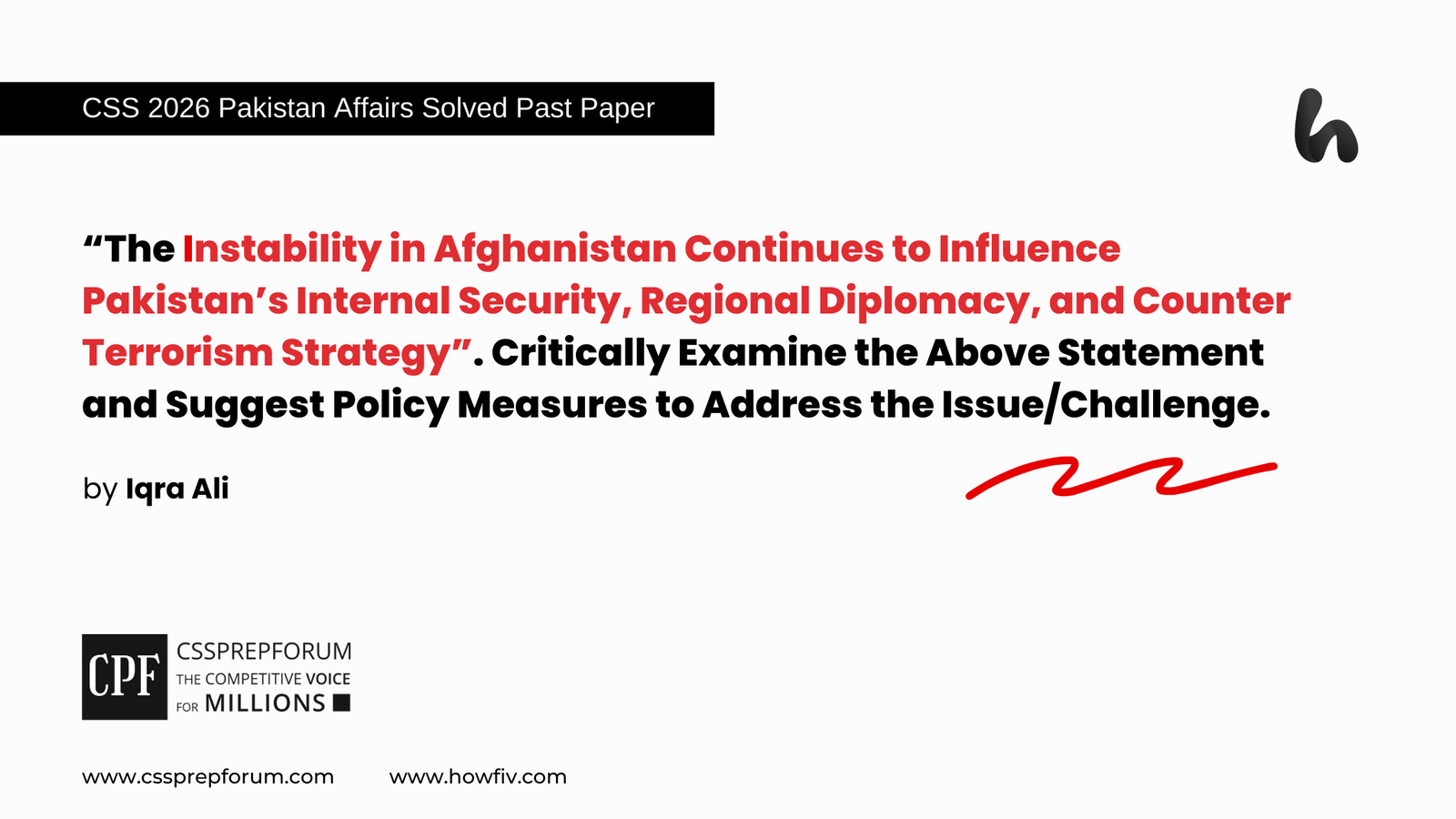CSS Special 2023 Solved Essays | Developing Countries Must Be Able to Reap the Benefits of International Trade
Ayesha Irfan, a Sir Syed Kazim Ali student, has attempted the CSS Special 2023 essay “Developing Countries Must be able to Reap the Benefits of International Trade ” on the given pattern, which Sir Syed Kazim Ali teaches his students. Sir Syed Kazim Ali has been Pakistan’s top English writing and CSS, PMS essay and precis coach with the highest success rate of his students. The essay is uploaded to help other competitive aspirants learn and practice essay writing techniques and patterns to qualify for the essay paper.

Outline
1- Introduction
As international trade, an essential form of the economic engine of the contemporary global economy, provides countries with the best mechanisms for the exchange of their goods and services to drive their economies upward, the developing countries must fill all their social, economic, and political domains’ loopholes to take full advantage of international trade by addressing their glaring disparities, social inequality and injustice, economic equilibrium, and, above all, political instability.
2- Debunking the term “International trade” and explaining its principles from a broader perspective
- ✓What is international trade?
- ✓Principles of international trade according to the General Agreements on Tariff and Trade (GATT)
- 1- Treating all countries equally: The Most-Favored-Nation (MFN)
- 2- Treating all goods equally within a given market: The Principle of National Treatment (NT)
- 3- Tariff Binding
- 4- Ban on Quantitative restrictions
3- International trade: Characteristics and contributions to a country’s overall growth
- ✓Exchanging different goods and services, along with necessary regulations
- ✓Enhancing currency flow in the form of exchange rate, expanding offers in the market
- ✓Encouraging the Gross Domestic Production (GDP) of a country
4- How developing countries must be able to reap the benefits of international trade?
- Social abilities
- ✓Prioritizing the skill-based and technical education in the country
- Case in Point: 99.8pc scoring highly educated populace, along with innovative, entrepreneurial, and skilled labour force- The case of Germany
- ✓Focusing on the promotion of gender equality, boosting its trade
- Case in Point: According to the International Trade Center Survey, “In twenty developing countries, only 20 per cent of exporting private companies are owned by women.”
- ✓Working on the country’s inclusive growth by providing jobs and reducing poverty, supporting multi-trading systems
- Case in Point: According to the Organization of Economic Cooperation and Development,” China has the lowest poverty of about 0.5pc in 2022 due to its focus on multiple trading systems”
- ✓Prioritizing the skill-based and technical education in the country
- Economic abilities
- ✓Attracting the Foreign Direct Investment (FDI) in the country due to its continuous economic stability
- Case in Point: “Saudi Arabia, having good economic outlook, has a low inflation rate of 2pc in 2023, along with booming Foreign Exchange rate at 402.1 USD billion”, according to the Trading Economics
- ✓Focusing on export diversification by adding value to different varieties of products, catering for the demands of multiple consumers
- Case in Point: India’s Foreign Trade Policy (2023), a clear manifestation of the case, clearly demonstrating the modifications in the export sector’s key areas accommodating the emerging needs of exporters via cooperation
- ✓Boosting the growth of the Micro, Small, and Medium-sized Enterprises (MSMEs), further engaging international trade
- Case in Point: The Malaysian multipronged national-level initiative to support MSMEs after Covid 19, valid evidence by the United Nations Development Program, also providing recommendations to other developing countries regarding growth
- ✓Attracting the Foreign Direct Investment (FDI) in the country due to its continuous economic stability
- Political abilities
- ✓Formulating flexible, trade-friendly government tax and subsidies policies and programs, attracting other countries for trade agreements
- Case in Point: Estonia scored top rank in the 2022 International Tax Competitiveness Index rankings due to its lucrative taxing system, making it the most favourable trading country on the global front
- ✓Developing a positive international-level image to promote regional trade integration
- Case in Point: Intra-African exports, boosted from 27 to 32pc on average in 2023 under the African Continental Free Trade Agreement with a great focus on the promulgation of peace and growth
- ✓Advancing the country’s resources endowments and producing differentiated technology, giving comparative advantage for advantageous trade to others
- Case in Point: China’s natural resources enhance its supply-side capacity, along with its heavy investment in many areas of technology, making it the world’s leading trade-related infrastructure
- ✓Formulating flexible, trade-friendly government tax and subsidies policies and programs, attracting other countries for trade agreements
5- What prospects will developing countries witness if they effectively reap the benefits of international trade after becoming able to?
- ✓To improve the living standards of people
- Case in Point: According to Vision 2030, “Pakistan will achieve all 17 Sustainable Development Goals (SDGs), making its people’s life easier.”
- ✓To bring a greater level of technological innovation to developing countries
- Case in Point: Rwanda’s technology dream, according to its Vision 2050, will be fulfilled
- ✓To increase market competitiveness among developed and developing countries
- Case in Point: Brazil, Russia, India, China, and South Africa (BRICS) will enter the domain of the first-world countries
- ✓To raise the developing countries’ say on the international platform
- Case in Point: Pakistan’s say in Kashmir and Water dispute case with India at the international forums
6- Critical Analysis
7- Conclusion

Trade, an intricate web of transactions transcending borders and connecting the world’s nations, is the lifeblood of the global economy. With its rapid evolution in the twenty-first liberalized century from the barter system to the international trading system, it works as a catalyst for the socio-economic, political, cultural, and technical growth of all countries, especially developing ones, making them able to match the pace of the world. Defined by economists, international trade is the best medium allowing countries to access each other’s goods and services via utilizing specialization and comparative advantage strategies. Stepping forward along its lines, the potent engine of economic growth and cross-border cooperation holds the promise of progress and prosperity for all nations. Therefore, developing countries must have to fill all their social, economic, and political domains’ loopholes to take full advantage of international trade. Considering the growing interdependence of the world, developing countries should address their glaring disparities and raise the critical questions of social inequality and injustice, economic equilibrium, and, above all, political stability. In this way, they will develop to such an extent that equity and inclusion would be their mere ideals but the cornerstones of a sustainable and harmonious world. However, a few countries desirous of becoming a hegemon sometimes opt for zero-some pathways and ignore the fruits of international trade, which gives them short-term growth, along with their descending fate. This essay mainly throws light on the maxim of how developing countries must be able to reap the benefits of international trade.
Delving deep into the understanding of the concept of international trade, it is the method of economic interaction among countries in the age of globalization. Basically, the method involves the exchange of goods and services between two countries in the form of exports and imports. By doing this, many countries have developed good international relations in the form of a customer base by understanding the trends of global trade. In fact, there are four basic principles underpinned in the General Agreements on Tariff and Trade (GATT), working under the umbrella of the World Trade Organization, according to which the developing countries regulate their trade flows. Analyzing these rules closely in the era of liberalization, the Most-Favored-Nation (MFN) rule allows all developing countries to treat themselves equally; the National Treatment (NT) allows them to treat all goods equally within a given market so that everyone can take part in trade. Besides this, via Tariff Binding, the countries can impose tariffs on their imports, giving to others and maintaining the balance of trade within their country. Lastly, the ban on Quantitative restrictions like quotas can be imposed by the developing countries on others’ goods, just to show their leverage power on each other, explaining the trade mechanism cycle in the international market.
Read More
Before jumping on the maxim of how developing countries must be able to reap the benefits of international trade, it is of great importance to take an overview of the characteristics and contributions of International trade for a country’s overall growth. Due to the rise in global associations and communications, international trade has seen a sharp rise in the exchange of different goods and services, along with necessary regulations. Through this, the countries can legally control the procedures of taxation and transactions. In addition, international trade at this stage also enhances currency flow in the form of exchange rates, expanding offers in the market for all and broadening the win-win cooperation spectrum among developing and developed countries. Lastly, the most important characteristic of this trading system is that it provides a comparative advantage to one over others by raising the competitive edge for all in the market, best for the encouragement of the country’s Gross Domestic Production (GDP), that is the main driver behind the inflow of the Foreign Direct Investments (FDI) in it.
Focusing on the question of how developing countries must be able to reap the benefits of international trade in the social domain, developing countries have to focus on the upliftment of skill-based and technical education in their system. By doing so, the public would be aware of the market trends and innovative ways to control the reigns of international trade in the highly advanced era. For instance, Germany has done a lot in this case, which is evident from its scoring rate, which is 99.8 per cent in the highly educated populace indices, having the most innovative, entrepreneurial, and skilled labour force. Indeed, the country’s economic cycle has been booming for years. Thus, every country should have to follow in the footsteps of Germany so that they can take advantage of international trade in the future.
Next to it, to enjoy the perks of international trade to the fullest, developing countries should focus on the promotion of gender equality in them like the developed ones. As cars can only be driven properly by two wheels, countries will also generate the maximum GDP only when men and women work hand in hand with equity. According to the International Trade Center Survey, “In twenty developing countries, only 20 per cent of exporting private companies are owned by women.” It means that incentives should be given to women, which would be helpful in the abridgement of the gaps, and they can equally excel in their relevant domains and contribute to the internal as well as external growth of their nation. So, women’s contribution will play a curative role for developing countries in reaping the benefits of international trade.
Moreover, for the social upliftment of developing countries, which is necessary for better international trade ties among them, it is imperative for them to boost their inclusive growth, ultimately providing jobs and reducing poverty among their masses. Whenever the country becomes strong inwardly, it will automatically become more attentive to increase the efficiency of its multi-trading systems on the global front. According to the Organization of Economic Cooperation and Development, “China has the lowest poverty rate of about 0.5 per cent in 2022 due to its focus on multiple trading systems”. Truly, the country, just like killing two birds with one arrow, has effectively reduced poverty with its double circulation model and also diversified its trading mechanism internationally. Hence, developing countries must grow socially so that they can contribute to international trade.
Moving towards the economic domain, developing countries must have to be stable economically with continuous growth to attract the maximum FDI in them. This is only possible when there is a low inflation rate with good foreign exchange reserve indicators. This shows that their financial bucket is so sufficient that they can give a competitive edge to others via their specialized goods. According to Trading Economics, “Saudi Arabia, having good economic outlook, has a low inflation rate of 2pc in 2023, along with booming Foreign Exchange rate at 402.1 USD billion”. This is the only reason that Saudi Arabia, among all other Muslim countries, is the most powerful country in terms of logistics, luxury items, and various natural resources, alluring others for trade. Thus, developing countries must strengthen their economic wheel to run their international trade engine.
Speaking in a similar vein, developing countries should focus on their export diversification and the addition of value to different varieties of products to win the comparative advantage race in the global trading competition. By doing so, countries can easily cater for the demands of multiple consumers and attract the attention of the huge market towards their offers and goods. India’s Foreign Trade Policy (2023), a clear manifestation of the case, is a clear demonstration of the modifications in the export sector’s key areas, accommodating the emerging needs of exporters via cooperation. Without any doubt, the country has changed the dimensions of its policy by the inclusion of various win-win principles so that it can touch the boom of international trading. Therefore, every country must be able to broaden its horizon in the international market.
Further, developing countries must boost the growth of their Micro, Small, and Medium-sized Enterprises (MSMEs) that collectively engage them in international trade. Undoubtedly, their contribution will make countries strong internally, as it gives a push and strength to their local industries. For instance, the Malaysian multipronged national-level initiative to support MSMEs after COVID-19 is a valid case in Point by the United Nations Development Program, which also providing recommendations to other developing countries regarding growth. Thus, if all developing countries adopt its recommendations, including innovation, digitalization, startup strategies, and many more, they can also take advantage of their MSMEs and bear the maximum fruits of international trade in today’s world.
Taking a glance at developing countries’ ability on the political level, the developing countries governments, when formulating flexible, trade-friendly tax and subsidy policies and programs, always attract other countries for trade agreements. Indeed, their lucrative policies maintain the Balance of Payment and Trade them, which makes the ground of multilateral trade agreements in the international market. For example, Estonia has scored top rank in the 2022 International Tax Competitiveness Index rankings due to its lucrative taxing system, making it the most favourable trading country on the global front. Thus, the leaders of developing countries must develop policies that contribute to their progression instead of regression in the international trading market.
Along with it, developing countries should develop their positive image at the international level, the most important indicator for the promotion of regional trade integration among them. Precisely, the more peaceful the country is, the more chances there are for cooperation. For example, intra-African exports have boosted from 27 to 32 per cent on average in 2023 under the African Continental Free Trade Agreement with a great focus on the promulgation of peace and growth. It means that the countries in the African region have started focusing on the promotion of integration and infrastructure development so that they can overthrow the anathema of poverty, terrorism, and piracy in them. They could attract other developing and developed countries to focus on them for trade. Thus, the positive outlook of the developing countries is the prerequisite to avail better trading opportunities on the global platform.
Last but not least, developing countries should advance resource endowments, like natural resources and infrastructure development, and indulge in the production of differentiated technology, giving a comparative advantage for advantageous trade to others. In this manner, they will become capable of displaying various goods in front of the world, which help them raise the bar of competitiveness among all. For instance, China’s natural resources, such as silicon and rare earth minerals, have enhanced its supply-side capacity, along with its heavy investment in many areas of technology, making it the world’s leading trade-related infrastructure. Due to the exploration of its potential, the country is now called an economic giant at the international forum, and it is fully playing its role by offering trade cards to others. Thus, all developing must be able to fulfil their trading appetite on the global stage.
Undoubtedly, there is a prosperous future for all the developing countries if they effectively and successfully reap the benefits of international trade after becoming capable. First, the living standards of the people of developing countries will be improved, as the now poverty-stricken masses will live lives full of comfort, along with the availability of all the facilities and necessities at large. For instance, “Pakistan will achieve all 17 Sustainable Development Goals (SDGs), making its people’s life easier”, according to its Vision 2030. Besides, the development will become successful in bringing a greater level of technological innovation to them. Such as Rwanda’s technology dream according to its Vision 2050 will be fulfilled. After this,all the third-world and poor countries will also raise their bar and bid accordingly in the international market.
In a powerful diagnosis, the market competitiveness among developed and developing countries would increase, and fair competition would take its toll on mercantilist and neo-imperialist practices. In this way, many countries can simultaneously become economic giants and force developed ones to live with cooperation and peace instead of force and aggression. For instance, Brazil, Russia, India, China, and South Africa (BRICS) will enter the domain of the first world countries in the coming years. Lastly, developing countries, due to their economic strength, can actively put an end to foreign intervention in their disputes with a strong say at the international forums. For example, Pakistan, when able to beat the international market, will never allow any developed nation to resolve the Kashmir and Water dispute cases with India via backdoor diplomacy. So, international trade can play a key role in the growth of all developing countries.
To conclude, developing countries can prosper due to the principles of international trade in highly globalized and interconnected villages. Indeed, these countries can unfold many social, economic, and political ways that paved the way for success and development for them. Based on the pillars of equality, innovation, economic balance, and political consensus, these developing countries will become so strong that they can easily compete with the developed countries openly in the liberalized world. As a result, peace, harmony, and advancement will become their fate, along with the flood of opportunities for them in the international trade realm. Whereas, some lusty countries seeking absolutism do not prefer collectivism of international trade and gain boom shortly but always fall into their own pit later. Therefore, developing countries have to learn the lessons from their decline and focus on strengthening themselves to reap the benefits of international trade.
CSS Solved Past Papers’ Essays
Looking for the last ten years of CSS and PMS Solved Essays and want to know how Sir Kazim’s students write and score the highest marks in the essays’ papers? Then, click on the CSS Solved Essays to start reading them.
CSS Solved Essays
CSS Special 2023 Solved Essays
Are you searching for CSS 2023 solved essays by Sir Syed Kazim Ali’s students? Click on any of the topics to start reading the solved essay
| 1. | It Matters Not What Someone is Born, but What They Grow to Be |
| 2. | Developing countries must be able to reap the benefits of international trade. |
| 3. | Artificial intelligence has overstepped its bounds. |
| 4. | No legacy is so rich as honesty. |
| 5. | Social media has destroyed real life communication. |
| 6. | Globalization: The end of austerity. |
| 7. | Children must be taught how to think, not what to think. |
| 8. | Pakistani women have the same chances as men. |
| 9. | Unipolar, bipolar or multipolar: New direction of the world. |
| 10. | So, surely, with hardship comes ease. |
CSS Solved General Science & Ability Past Papers
Want to read the last ten years’ General Science & Ability Solved Past Papers to learn how to attempt them and to score high? Let’s click on the link below to read them all freely. All past papers have been solved by Miss Iqra Ali & Dr Nishat Baloch, Pakistan’s top CSS GSA coach having the highest score of their students. General Science & Ability Solved Past Papers
Articles Might Interest You!
The following are some of the most important articles for CSS and PMS aspirants. Click on any to start reading.











